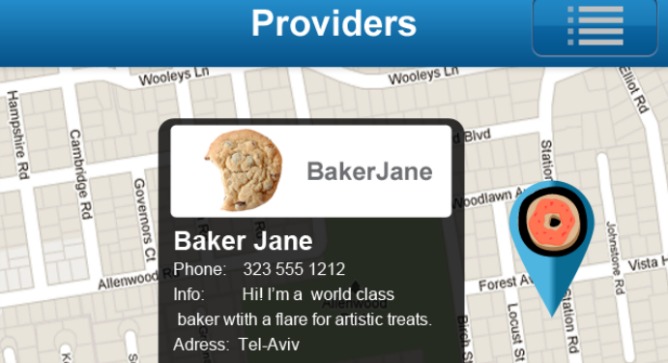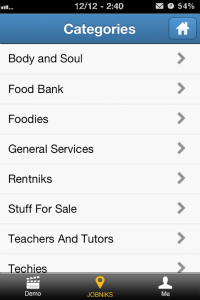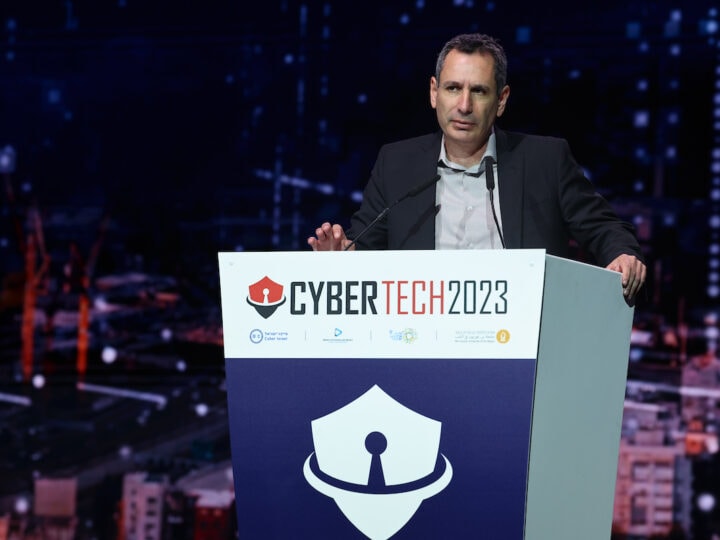If you run a little cottage industry – say, hair styling or computer repair – many of your potential customers are right in your neighborhood. But getting the word out can be difficult, expensive and time-consuming.
It was for this purpose that Jobniks is launching a beta app in Israel, Los Angeles and San Francisco.
Spread the Word
• Email this article to friends or colleagues
• Share this article on Facebook or Twitter
• Write about and link to this article on your blog
• Local relevancy? Send this article to your local press
“Jobniks creates a map of goods and services being sold by people in close proximity to one another. So you can buy cakes from Jodi down the block, and Mike across the street can hire you to teach his daughter piano,” the website for the app explains.
About two years ago, Zeev Dzialoshinsky read in a local Israeli paper about a financially strapped woman peddling pastries from her own kitchen to a local restaurant. Diners liked her baking and the restaurateur ordered more, but to make enough income she had to build up her business with other area establishments as well.
Dzialoshinsky thought there must be a better way. So he recruited his entrepreneur son, Koby, to help him create a platform for micro-business owners, like the Israeli home baker, to target potential customers in their own backyards more easily.
Through an innovative geo-location app available on iOS and Android, Jobniks recognizes where you are. It lets the people you’re looking for – and the people who are looking for you — know that you’re nearby. You can chat, call and email at the touch of a button.
Initially, Jobniks was a website, but then Koby’s economist wife Ronit joined the effort and suggested that mobile offered a better way for service providers and potential clients to communicate and connect to each other, Koby Dzialoshinsky tells ISRAEL21 from Shanghai, where his architectural business Solrox is based.
“From there we built what services we wanted to have people offer,” he says. “We spoke to friends to see what they wanted.”
Koby and Ronit currently live in Los Angeles, and decided to launch the free app in two California cities as well. “It’s being developed in Israel, but the real potential is in the US,” he says. “Once we have established momentum, we will go into other cities.” A launch in Australia, where Koby spent his childhood, is about six months down the line.
Zeev, the CTO with a background in information technology, oversees Jobniks’ Israeli operation out of an office in Rishon LeZion.
A fair chance for everyone
Among Israelis, the term “jobnik” refers to a non-combat soldier. The trio thought the name worked well in English too, because it’s easily pronounceable and catchy. Dzialoshinsky, 27, says it brings a smile to people’s faces.
“The reason we created Jobniks is to help people and build communities,” says the young entrepreneur, who put up much of the money to finance the app.
“As you know, people from around the world have been taking to the streets to protest rising prices and stagnating incomes. Corporate profits have been rising, while the average person has been struggling. I really felt I needed to do more.”
And this app does aim to do more. Not only does Jobniks offer you a better solution for earning money, saving money and supporting your community, says Dzialoshinsky, but it also will list area food banks and carpools. A “Rentnik” category will allow users to list items they can rent out, such as wedding dresses, tools, designer bags or jewelry.
Dzialoshinsky is not looking to make money on the app.
“Investors wanted to charge people to use the app, and we fought hard to remain free always, but we will allow advertisements for our service providers,” he says. “That will roll out in the next few months.”
For now, the emphasis is on maximizing the list of participating goods and services providers, and partnering with organizations such as women’s leadership groups, government unemployment agencies and community centers.
At the end of the day, he says, “We’ll find a way to realize profit, but not on the backs of our users. We want to give them all a fair chance.”


















